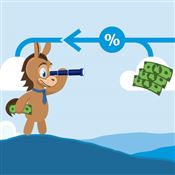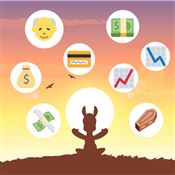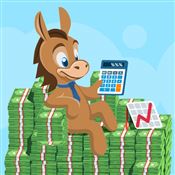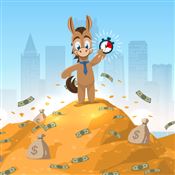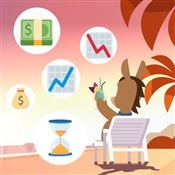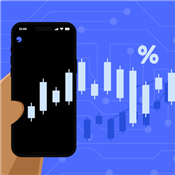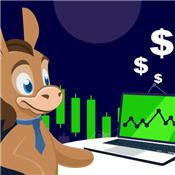Inflation Calculator
When the value of your money goes down and prices go up, that's inflation. But is that all there is?
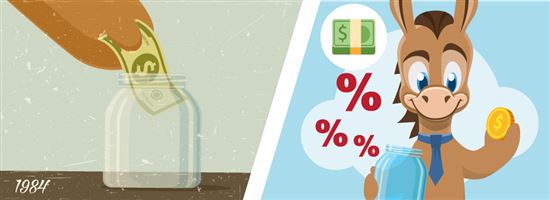 |
Inflation is a constant presence in every economy.
You've probably heard this word a million times. But what is the rate of inflation in the U.S.? How steady is it? And what does it mean for you?
In simple terms, it means your money is worth less. But that's not the whole story.
How to Use the Calculator
To calculate inflation over time, you can use the calculator. You can also input prices of things you have bought years ago.
To use it:
- Input the first date when the item was bought (alternatively, any year you may want to know the inflation from)
- Select a price point
- Input today's date (or whichever year you want to compare to)
- Click calculate
What is Inflation
Inflation is the price increase within a certain time frame, and it measures the cost increase of a basket of goods and services. The U.S. Bureau of Labor Statistics will check the prices of about 80,000 items each month to determine the rate of inflation.[1]
The most widely used measure of inflation is the Consumer Price Index (CPI), calculated by the U.S. Bureau of Labor Statistics (BLS).[2]
So, dollar inflation represents the decline of its power purchase.
If last year you were able to buy a mattress for $100 and today you need $110 for that, you're dealing with inflation. In this case, the price inflated by 10%.
It is easy to measure the price inflation of a single product. But people need more than a few products to survive, which is why inflation measures the price change of products and services over time.
A good rate of inflation is 2% and under. But that rate is hard to achieve since inflation isn't something that can be controlled easily. Often the rate of inflation will be much more than that.[3][4]
Essentially, prices going up represents inflation.
What Causes Inflation: Types of Inflation
Demand-Pull
Demand-pull inflation happens when demand rises, but not supply. This means people have more money and want to buy many goods. But production stays the same and companies can't provide.
In such cases, companies will raise prices to keep up with supply.
Cost-Push
This inflation happens when the cost of production goes up. With production costing more, eventually, the goods cost more. For instance, if the cost of energy production (or raw material, oil) goes up, then many consumer goods prices will do so too.
Built-In
This is the wage-price spiral. As prices go up, workers demand higher wages. Increased wages make prices go up, and so on. This is a continuous cycle, hence the name spiral.
Hyperinflation
Hyperinflation is not a common occurrence.
It is caused when a country overproduces money, causing it to lose value. For instance, Venezuela started to experience an economic crisis due to hyperinflation around 2010. The situation was so bad that locals used money as a product, making bags and ornaments out of it as it was more valuable to them than the money itself.
How Is Inflation Controlled?
This loss of monetary power affects the lives of everyone using the currency since with time, they can buy fewer goods for the same amount of money. But that doesn't end there.
The pressure to make it work falls on the central bank:
- Making sure that people have enough money to buy the goods they need.
- Setting the ideal inflation rate per year.
It's on the central bank to make sure the economy keeps running smoothly with inflation.
Banks will also raise or lower interest rates to control inflation. This way, they control how likely people are to take loans.
- Higher interest rates are imposed to stop people from buying more and causing more inflation.
- Lower rates are imposed after inflation so people can keep buying things.
With the rapid devaluation of money and price increase, hyperinflation happens. These are extreme cases of inflation, where money becomes almost worthless.
A few times this has happened:
- Germany in the 1920s
- Peru in 1990
- Zimbabwe in 2007-2008
What does Dollar Inflation Mean for Me?
Inflation will likely cause you to be able to buy fewer things. Even if you're earning the same, the value of your money has decreased.
How to Protect Yourself
You can start by trying to get multiple sources of income. Or even a job that offers promotions as well as annual raises, based on performance.
If you have an annual raise of, for example, 5%, then you will likely not be as affected by inflation. You will be able to afford consumer goods, housing, and many other things you need.
How to Protect Your Savings
Another way you can protect yourself is with investments. While inflation is unavoidable, investing in the stock market can return a percentage of your money.[5]
Or you can invest in something that resists inflation, such as gold.
No, quite the opposite. Inflation decreases the value of the dollar, meaning you can buy fewer things with the same amount of money over time.
Bottom Line: Is Inflation Bad or Good
Inflation can be good or bad, depending on who you ask.
Those with a lot of monetary assets will say it's bad, as will people who don't have any kind of investments. But those who own property assets will benefit from inflation.
Whether it is good or bad, inflation is unavoidable.
References
- ^ U.S. Bureau of Labor Statistics. Consumer Price Index FAQ: How Are CPI Prices Collected and Reviewed?, Retrieved 7/10/2022
- ^ U.S. Bureau of Labor Statistics. Consumer Price Index, Retrieved 7/10/2022
- ^ Federal Reserve Board. What is an acceptable level of inflation?, Retrieved 7/10/2022
- ^ Federal Reserve Board. Why does the Federal Reserve aim for inflation of 2 percent over the longer run?, Retrieved 7/10/2022
- ^ SEC. Saving and Investing, Retrieved 7/10/2022
|
|
| ||||||
|
|
|

